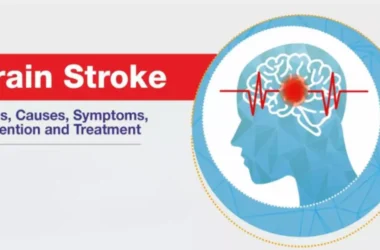[ez-toc]
Introduction
As of 2023, heart disease remained the leading cause of death in the world, according to the Centers for Disease Control and Prevention (CDC).
While factors like genetics can make some individuals more susceptible to heart disease, the best way to avoid heart-related issues is by taking proactive steps to care for your heart health.
The American Heart Association (AHA) emphasizes that many risk factors can be modified or controlled.
The role of lifestyle in maintaining heart health is significant, as noted by Dr. Holly S. Andersen, an attending cardiologist and associate professor of clinical medicine at the New York-Presbyterian Hospital, Weill Cornell Medical Center.
Dr. Andersen highlights that lifestyle choices often carry more weight than genetics when it comes to heart health. In fact, the AHA estimates that a remarkable 80% of cardiovascular disease, encompassing heart disease and stroke, can be prevented through proactive measures.
Dr. Jennifer Haythe, an associate professor of medicine in cardiology at the Center for Advanced Cardiac Care and director of the cardio-obstetrics program at Columbia University Irving Medical Center, concurs.
She emphasizes that a significant portion of heart disease can be prevented by individuals taking good care of their heart health from their 20s, 30s, and 40s onward.
By doing so, they can potentially avoid the need for extensive cardiologist visits throughout their lives.
So, what actions can you take to maintain optimal cardiac health as you age? Here are some informative tips to help you modify your daily routine and keep your heart healthy.
Video[7 Ways To Keep Your Heart Healthy]
Credit: Health.com
Exercise Most Days of the Week

The American Heart Association (AHA) suggests that a minimum of 150 minutes of moderate to intense exercise per week is a healthy goal.
If you can’t commit to that, an alternative is engaging in more vigorous aerobic activities for 75 minutes a week or a combination of both moderate and intense exercises.
It’s essential to note that the AHA advises spreading your exercise routine throughout the week rather than trying to squeeze it into just one or two days.
According to Dr. Andersen, “Physical activity is the fountain of youth” and can enhance the efficiency of your cardiovascular system.
Also Read: 7 Tips for Building a Daily Meditation Practice
If fitting a formal workout into your daily schedule proves to be a challenge, Dr. Andersen recommends striving to engage in activities that elevate your heart rate every day, including something as simple as walking, which is also beneficial.
Keep Your Blood Pressure in a Good Range

Annual check-ups are essential for a reason. During these appointments, your healthcare provider can assess you for signs of heart disease and keep a close eye on your blood pressure, according to Dr. Haythe.
Understanding your blood pressure is of utmost importance because high blood pressure (known medically as hypertension) typically doesn’t display specific symptoms.
However, uncontrolled high blood pressure can increase the risk of heart disease, as highlighted by the CDC. When you and your healthcare provider regularly monitor your blood pressure, you can take proactive steps to address any rise in its levels.
In the event that you are diagnosed with high blood pressure, it’s crucial to follow your healthcare provider’s guidance.
They may recommend lifestyle adjustments or prescribe medication. If medication is prescribed, it’s essential to adhere to the prescribed regimen consistently.
Additionally, you may consider obtaining an at-home blood pressure cuff, which empowers you to monitor your blood pressure on a regular basis.
Look Into Your Diet
A healthy lifestyle heavily relies on your dietary choices. While the Mediterranean diet often garners attention for its focus on healthy fats and fresh ingredients, both the American Heart Association (AHA) and MedlinePlus endorse the DASH diet as beneficial for heart health.
If you’re not familiar with it, the DASH diet is a dietary plan founded on research from the National Heart, Lung, and Blood Institute (NHLBI).
DASH, which stands for “dietary approaches to stop hypertension,” has been shown to reduce high blood pressure and improve cholesterol levels, thus lowering the risk of heart disease, according to MedlinePlus.
The DASH diet shares many guidelines with the Mediterranean diet but allows for a slightly greater consumption of dairy products and meat.
However, the Mediterranean diet remains in the spotlight for good reasons. It boasts a substantial body of evidence supporting its effectiveness in reducing the risk of cardiovascular events.
For instance, a 2018 study published in The New England Journal of Medicine, involving 7,447 participants, found that those at high risk of cardiovascular disease who followed a Mediterranean diet were less likely to experience major cardiovascular events compared to those who followed a reduced-fat diet.
The Mediterranean diet, as recommended by the AHA, encourages you to incorporate and limit specific foods as follows:
- Consume generous portions of vegetables, fruits, whole grains, and legumes.
- Embrace healthy fats in your diet, including extra virgin olive oil, avocados, seeds, and nuts.
- Enjoy in moderation: low-fat or fat-free dairy products, eggs, and poultry.
- Include low to moderate amounts of fish, which are rich in heart-healthy omega-3 fatty acids, known for their anti-inflammatory properties. Opt for sustainably caught or farmed fish.
- Wine is acceptable in modest quantities, preferably consumed with meals.
- Restrict the intake of sugar-sweetened beverages and sweets, and opt for fruit over sugary desserts.
- Reduce your consumption of red meat and opt for fish or poultry.
- Minimize processed foods and choose minimally processed, plant-based options over highly processed foods like chips and processed meats.
Assess Your Weight

Maintaining a healthy weight for your heart is akin to striking the right balance, much like Goldilocks finding the perfect porridge. However, it’s essential to note that extremes in weight can be associated with cardiovascular risks.
Research from a 2017 study published in Medicine (Baltimore) indicates that being underweight, defined as having a Body Mass Index (BMI) below 18.5 kg/m2, can increase the likelihood of developing cardiovascular diseases.
It’s important to recognize that BMI, though widely used in the medical field, has its limitations. It overlooks key factors like body composition, ethnicity, sex, race, and age.
On the other hand, being overweight or obese also poses a risk to heart health. A 2021 Scientific Statement by the American Heart Association, published in the journal Circulation, highlights the direct connection between obesity and cardiovascular risk factors.
These include dyslipidemia, type 2 diabetes, hypertension, and sleep disorders. Obesity can also independently contribute to the development of cardiovascular disease and an increased risk of cardiovascular-related mortality.
It’s worth noting that obesity is a complex condition, and it’s not solely determined by the amount of body fat a person has. Regional body fat distribution also plays a role in affecting heart health.
For those with obesity, making lifestyle changes, such as engaging in regular physical activity and adopting a healthy diet, can have positive effects on heart health.
However, it’s crucial to consult with a healthcare provider to determine the most suitable options for your individual circumstances.
Do Your Best To Minimize Stress

Seriously. Stress can be tough on your heart, but it can also lead to being inactive and overeating, which can cause high blood pressure and high cholesterol, the AHA says. And that can up your risk of heart disease.
Still, it’s tough to avoid stress. “We’re all so stressed out right now,” said Dr. Haythe. “It’s hard.” Annapoorna Kini, MD, interventional director of the structural heart program at Mount Sinai Hospital, recommended adding meditation and deep breathing exercises to your day—they only take a few minutes.
Aim for the Right Amount of Sleep

Individual sleep needs may vary, but the Centers for Disease Control and Prevention (CDC) recommends that most adults aim for seven to nine hours of sleep per night.
Falling consistently short of this target may have adverse effects on your heart health. Dr. Andersen points out that inadequate sleep has been associated with elevated blood pressure and can hinder weight loss efforts.
Furthermore, it can reduce your motivation to engage in physical activity, which is not favorable for heart health.
Dr. Kini underscores the importance of sleep as a period for your heart to rejuvenate. During sleep, your heart rate decreases, hormone levels stabilize, and stress is minimized.
This downtime is not only beneficial for your heart but also contributes to your overall well-being.
Don’t Smoke

Most people are aware by now that smoking is linked to all kinds of serious health issues. Cigarette smoking raises your blood pressure and puts you at a higher risk of having a heart attack and stroke, Medline Plus points out.
“Smoking is bad for the heart and lungs—it’s bad in every way,” said Dr. Kini. Avoiding smoking is so important that Dr. Haythe noted this is the “single most important thing you can do” to lower your risk of heart disease.
:max_bytes(150000):strip_icc():format(webp)/AnthonyPearsonMD-8b84eec42e584e5ab9c8ff800575954f.jpg) Medically reviewed by Anthony Pearson, MD
Medically reviewed by Anthony Pearson, MD





